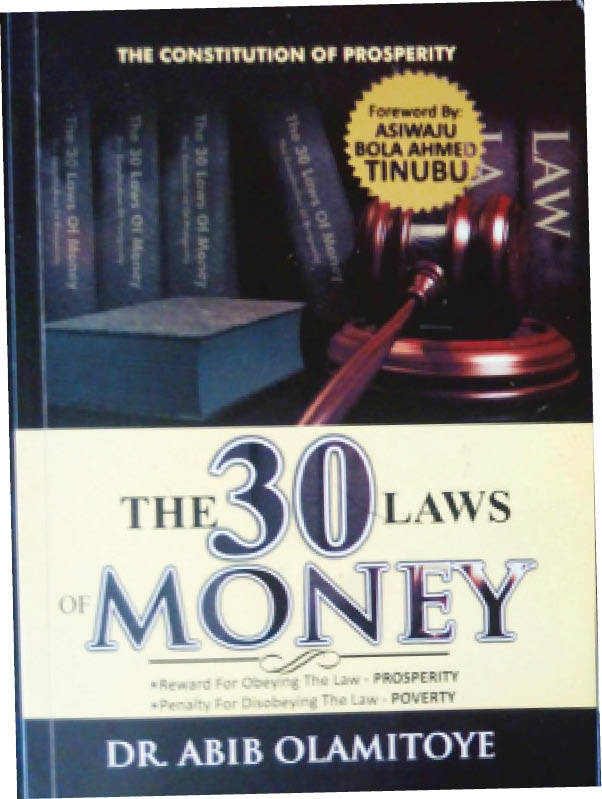Getting money sense reading Olamitoye’s ‘cash manual’
The 30 Laws of Money’ by Dr. Abib Olamitoye is an extra-ordinary book. It’s revealing, motivating and inspirational, all at once. I could hardly drop it. When I did, I was thinking about it, brooding over the content and eager to continue. I have read several books that talk about money: how to make it […]


The 30 Laws of Money’ by Dr. Abib Olamitoye is an extra-ordinary book. It’s revealing, motivating and inspirational, all at once. I could hardly drop it. When I did, I was thinking about it, brooding over the content and eager to continue.
I have read several books that talk about money: how to make it and ways to keep it flowing. But Olamitoye’s work is unique. I liked the fact that I was reading what was a list of things to do and not to do, rather than the usual long sermons about capital, investment, profit and loss. There is so much packed, and in one book.
When I handled the book, the cover got me thinking, what would this Dr. Olamitoye tell me that I haven’t heard before? Is this just another self-help manual? Your guess is as good as mine. It isn’t, and perhaps the following information will help.
Before 2017 when ‘The 30 Laws of Money’ was published, this author had released other books, leaving a track record in the business and entrepreneurship world. They include ‘Growing Money Trees’, ‘Love Yourself, Pay Yourself First’, ‘How to Create a Business That Thrives in Your Absence’, ‘Executive Stress Management’, ‘Money and the Law of Attraction’, ‘Basic Entrepreneurship Skills for Smart Business People’, The Doctor and His Money, ‘Basic Communication Skills for Smart Business People’, and ‘Money in Marriage’.
The interesting thing about this writer is that his ‘money sermons’ cover areas other authors fail to focus on. This is what makes his work exceptional, and his latest, ‘The 30 Laws of Money’ is no different.
Some revelations in this book may appear impractical, but the author says this is how it works. So, whether or not a reader agrees is an entirely different matter. A typical example is Law Number Twenty-Six, The Law of Planning, where he writes that one will be living the greater part of his or her life in the future, and that the average person grows through the learning age for the first twenty-five years of life, the earning age of the twenty-five years that follows, until the yearning years that starts at fifty.
In his outline of Law Number One, which he calls The Babylonian Law, what he points out is only logical, that one should save at least 10 per cent from every income, profit, salary or wage. You must pay yourself first, he insists.
Sometimes Olamitoye reminds you of an ideology you may have come across. Like under Law Number Three, The Law of Abundance, he says you eventually bring about what you persistently think about, feel about, or write about:
“An easy way to bring about a condition of abundance is to perpetually ask and mentally seek the answer to the question, ‘How does it feel to have all I want? How does it feel to be a generous Billionaire?’”
A lot of what this author says appears very practical, such as what is stated in Law Number Five, The Law of Exchange. Here, he dwells on the importance of creating a product or service so as to collect the money equivalent. This is basic business sense. Virtually everyone needs to provide either service or a product in order to receive payment, except if one depends on others all his life or lives on a huge inheritance. He adds:
“You determine the price for your offerings; you fix the price for the product.”
He also points out that the better the product or the larger the quantity you successfully bring to the market, the more money one gets. The more you serve, the more you earn.
At the end of every chapter, this book has recommendations. A reader is asked to write a list of actions he or she will take, a day at a time, as a result of the awareness derived from the particular chapter. This makes reading the work more of an activity and gives it the ‘money manual’ status, which it has earned. Plus, readers are advised to take a chapter a day at a time. But I totally disregarded this rule. I just couldn’t stop reading. However, perhaps since my curiosity has already been satisfied I will now follow the rules.
There’s hardly anything to outrightly criticise or discard Olamitoye’s ‘money manual’, even if one disagrees with a few laws. It’s also difficult to write about it without giving too much away. But reading these laws is an exploration of financial wisdom in the strongest terms. Hardly is there anything that is left out. You learn that a portion of your earnings is yours, another for charity (tithe), a chunk for the rainy day and more. I’m glad I had the privilege of reading it.
